

Paul Thurrott's Merciless Attack on Artie MacStrawman
Passing up an opportunity to comment on a Paul Thurrott rant is like driving past paramedics at the scene of an accident. I know I should just keep driving and not hold up traffic, but there's an instinctive need to find out how truly awful things are and to determine what could have happened to cause such a disaster.
Thurrott's various Windows-related websites provide a comprehensive--and free--history of everything Microsoft over the last decade. He has written full reports of the company's announcements at annual events such as CES, and documented all manner of product releases and strategy plans that would otherwise have been forgotten.
Google for Windows, and you'll find a lot of useful information about Microsoft's past, contributed by Thurrott.
Fast, Loose, and Out of Control
It's only when Thurrott takes off his Microsoft historian hat and attempts to defend the company that his writing begins to induce a violent gag reflex.
It's not that Thurrott just really likes the company he's worked for and around for well over a decade. Really, good for him for being excited and enthusiastic about the subjects he covers.
What really is so disturbing about his ad nauseam rants against Apple and Google--and any other company that dares to compete against Microsoft--is that he delivers them, not as straightforward, factual criticism based on real issues, but rather as a falsely contrived bit of calculated emotionalism and populist pandering in a truly slimy way, mixing in facts he makes up on the fly and failing to cite any real support for his claims.
To top things off, Thurrott then sugar coats his ultra right-wing style absolutist fundamentalism with a thick, campy layer of extreme left-wing liberal faux-outrage.
He turns the political toolbox inside out to use every opportunity to spread the gospel that St. Microsoft the Divine is the last best hope for world peace, and then insists that everyone who disagrees with his intentionally misleading diatribes is a simply bad person who hates freedom, and likely a conservative religious nut, too.

It's like sitting through an anti-DRM speech given by Bill Gates, with assistance from Ann Coulter and the Sisters of Perpetual Indulgence: intellectually insulting, emotionally painful, and simply offensive to all the senses.
After digging through all the layers of political obfuscation, it's obvious that his point is not what's actually being said at all, but rather the conclusion that he demands you jump to on your own.
What Thurrott writes depends a lot on what he thinks his readers want to hear.
Innovation: Apple at Macworld vs Microsoft at CES cited how Thurrott described a recent Macworld to his Windows audience:
“Lost amid all the hubbub of CES was the start of Macworld Conference & Expo, which opened Tuesday with an unexciting Steve Jobs keynote. [...] All in all, Macworld was a rather boring affair."
In a sister publication he wrote of the exact same event:
"Jobs's Macworld address, widely expected to be an almost funereal event for an ailing company, instead turned into a tour de force celebration of technology, marketing, and sheer chutzpah [...]. Jobs also wowed the crowd and industry watchers with a slew of new product announcements, virtually none of which the rumor-savvy Macintosh online news organizations predicted."
Gag! So in which version were you telling us the truth Thurrott: in pooh-poohing Apple in front of your Windows friends, or in gushing about Jobs' "crowd wowing" to a more general audience? Which one paid you more? Are you a sellout or just a fabricator of flamboyant fictions?
Apple Hater, Extraordinaire
Thurrott has every right to publish his negative opinion about all things Apple. He has skipped no opportunity to exercise that right over the last decade, establishing himself alongside other Microsoft-financed luminaries such as Rob Enderle.
If Thurrott and Enderle were just screaming their anti-Apple screeds into the void of Usenet, it wouldn't be worth mentioning. However, both have wormed their way through the last decade leaving behind a frequent piles of regurgitated anti-Apple bile, making a career out of preaching a Microsoft-only doctrine and spreading fear and mistrust for any possible alternatives, and both have done so pretending to be impartial observers.
Thurrott purports to want to love Apple, but is stopped short by the realization that Microsoft is just superior in every way. As Apple struggled to recover in the late 90s, Thurrott was able to laugh at the company's plight as an unlikely contender, and certainly wasn't alone in painting Apple as an irrelevant, hopeless failure.
It's simply human nature to kick things that are down and think oneself better for doing so. It can also be both fun and cathartic to poke at a fallen giant.
Microsoft is Rubber, Apple is Glue!
However, as Apple began to turn around, Thurrott took it upon himself to invent a false reality where Apple was a dangerous threat to civilization, and anyone interested in the company's products was sure to be an irrational, deluded member of an insane cult.
Thurrott doesn’t need to invent or imagine anything; he simply takes every complaint ever leveled against Microsoft--and there are many--and recycles them to be about Apple, but without any basis:
The most absurd part of his "same to you, but more of it!" arguments--which desperately attempt to pin Microsoft's troubles on Apple, and increasingly, Google--is the fact that spewing them in such a recycled manner demonstrates that he is well aware of the ill past of Microsoft.
If Microsoft Then Good, Else Evil
Recently, his every stab at Microsoft's competitors--such as the purported Evil of Google or the Monopoly of iTunes--has included a reassurance that these companies are as bad or worse as Microsoft ever was, and also a reminder that Microsoft has repented and been born again as a sinless virgin.
Thurrott has absolved Microsoft of its "past" sins so many times that it begs raises the question: why does the company need to fork over $5-6 billion every year in “other costs,” huge portions of which are legal settlements and criminal fees paid for breaking the law?
Microsoft appears to spend more money on breaking the law every year than the FBI's top ten drug dealers combined. Paul, stop telling the world that Microsoft is a born again saint, because it's a lie, and you know it.
Historical Distortion
After painting today's Microsoft as a reformed entity that has changed dramatically from its old monopolistic ways from long, long ago, Thurrott is also quick to jump back in time to whitewash the old Microsoft as well.
When, exactly, was Microsoft not a saint? Why has it been repeatedly sued by nearly every competitor, the European Union, the US federal government, and by one American state after the other for cheating consumers?
Microsoft was most certainly at the top of its illicit games in 1997, the year when Thurrott claimed "Microsoft Showed Practicality, Compassion for Mac at Apple's Lowest Point."
What was this act of selfless compassion? It was the release of Office 98 for the Mac, and apparently the accompanying $150 million in non-voting stock Microsoft agreed to buy and hold for several years.
Thurrott attempts to spin Microsoft's release of Office 98 as a compassionate shipment of food to a starving country. The difference of course, is that Microsoft made huge profits on that food, and really set sail to establish a colony in order to expand its empire: a different situation than a compassionate delivery of emergency aid.
The Case of the Missing Office
Pointing out that "revenues from Mac Office fell from $200 million to $150 million between 1996 and 1997," Thurrott implies that Microsoft developed a new version of Office for Mac simply as an act of altruism to keep Apple alive, and that there was little hope for profit involved in the beleaguered and dying Mac market.

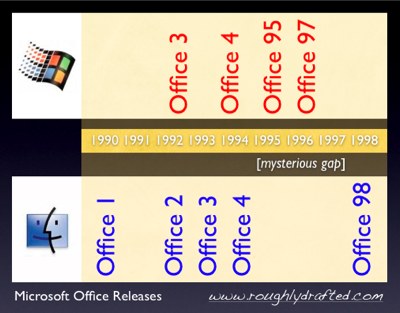

What he fails to mention is that the real reason Microsoft’s Mac Office profits were down was because the last new version for the Mac had been delivered back in 1994!
For some context, Microsoft released five major versions of Office for the Mac between 1990 and 1994, then nothing for the next three years. Did the company forget? What happened in 1995?
Hmm, a difficult puzzle to be sure.
Revenues for 1994's Office 4.2.1 for Mac were down in 1997 because Microsoft was selling an ancient, obsolete product.
That situation gave smaller competitors the opportunity to offer better alternatives to Office on the Mac, causing Word to fall from its place as the premier Mac word processor.
In comparison, Microsoft had introduced Office 96 97 8.0 for its own Windows platform at the end of 1996 - two generations ahead of the Mac version.
Interestingly, even with its four year old Mac version of Office, Microsoft was earning far more profits from Mac Office than Apple was on all its hardware and software sales combined!
Microsoft did not form its Mac Business Unit in 1997 to bail out Apple, but rather to deliver what it knew would be a very profitable software release of Office.
The Mac market offered Microsoft price-insensitive customers hungry for modern software and open to try out new features. The corporate Windows market for Office resisted change, and the overall PC market, while much larger than Apple's Mac market, only paid for a tiny fraction of the software it actually used. Microsoft knew this.
The Office Withdrawal Myth
Nearly a year ago, I wrote Unraveling the Office for Mac Withdrawal Myth, which countered the then common rumors that Microsoft could at any moment yank Office and obliterate Apple.
The simple fact is that Microsoft has always made huge profits selling Office for Mac; dropping it would be far more destructive for Microsoft than Apple. The idea of dropping it today is absolutely absurd, particularly since the company has committed to delivering it through at least 2011.
The recent flap, based upon emails released in the Iowa suit against Microsoft, jumps back in time to June 27, 1997, just a month before the company publicly committed to bring its Mac development efforts up to par with its Windows efforts at the August 1, 1997 Macworld Expo in Boston.
Was there any potential for Office to be canned back then? No.
Microsoft had already completed the majority of the work on what would eventually become Office Mac 98. What Bill Gates asked his Mac BU development team in that email was:
-
•"Realistically, when do we think we would ship this product?"
-
•"Can we avoid Apple knowing how far along we are for the next 30 days?"
Those questions do not even suggest the possibility that Microsoft was planning to cancel Office. Microsoft had announced the creation of the new Mac BU six months earlier in January 1997. It was formed expressly to develop Mac software, pointedly including a new version of Office! Microsoft has already promised it.
Gates' questions, emailed to his Mac BU developers, were not about canceling Office, but were instead trying to determine how well he could use the threat of cancelation as leverage against Apple. Why would Gates need to do that? Because Apple was busting his balls.
Mac Office, $150 Million, and the Story Nobody Covered
Apparently, Thurrott doesn't think anyone is interested in the truth about why Microsoft wanted to conceal Office development progress from Apple, or why it bought a suspiciously small amount of Apple stock a month later.
To Thurrott, it’s not so much a mystery as it is a wondrous miracle that glorifies St. Microsoft the Compassionate and gives the world new reasons to love its benevolent overlord as the creator of all things fresh and lovely.
Without providing any insight as to why Apple--a company that in 1997 reported over $1.2 billion in cash and $3.4 billion in current assets--needed an another $0.15 billion investment from Microsoft in order to survive, Thurrott jumped back out of the scary world of Factland and back into emotional sensationalism.
Artie Gets Beaten by the Broad Brush of Sensationalism
"Every Mac-oriented publication on earth, from what I can tell," Thurrott wrote, "has cited this email exchange as an example of Microsoft's ongoing efforts to keep Apple down."
Damn you, Artie MacStrawman. You should be ashamed of bearing false witness against St. Microsoft the Benevolent! You shall be forced to crawl upon your belly until you return to the dust from whence you came.
Anyone else really interested in examining the evidence themselves, Thurrott concluded, will "come away with a less dramatic version of history than the Mac pariahs are pushing."
Who are these Mac pariahs with dramatic versions of history? A writer at Computerworld?
I Don't Think That Word Means What You Think It Means
As a side note, a "pariah" is an outcast. The word comes from the Indian caste system; a social pariah is someone who who is ostracized, ridiculed, and persecuted because of their social status. Oops!
The only reason "Mac pariahs" could exist would be the establishment of a self-righteous class of asshat analysts who preach a non-stop message of hate and intolerance to inflame their readers and incite them to despise people who disagree with their views.
After the highly ironic use of that phrase, Thurrott then jumps to talking about his 8 year old boy, and compares his son's 8 year old behaviors with Mac users. At a time when "the Mac has no business even being around but is," he continues, "one might expect a bit of maturity on the part of [Mac] fans."
What is so immature about these "real crazies" (the reader excluded, of course)? Thurrott dished out his worst: "They see slights that don't exist. They make up problems with competing products. They push a fanciful version of history in which none of the bad stuff ever happened."
That string of text is perhaps the most absolutely hypocritical line of trash to ever spew from one person in the history of mankind.
Mr. Thurrott, you can't make your life's work one of spewing childish rants, devoid of facts and laced with made-up statistics, baselessly attacking competitors as "Evil" and rewriting history to make the the biggest albatross of the tech industry appear to really be a cute little hummingbird--and then, when your favorite company turns up a convicted monopolist, paying billions in fines and losing billions in failed enterprises every year, suddenly launch into a routine about how childish the rest of the world is for disagreeing with you.
Someday your son will be ashamed to find out you used him in a cute ploy to bash a class of people that you largely invented in order to win an childish argument, using words you do not really grasp, just for heightened sensationalism. He may then waste a considerable portion of his life attempting to track down Artie MacStrawman just to apologize.
Just a single day before accusing the collective Mac world of being as prone to tantrums as his young son, Thurrott had shot off a sassy criticism of his own.
He attacked Blackfriars' Carl Howe, who had presented a number of reports that all suggested good news for Apple in its first quarter Mac sales.
When Howe presents opinions on markets and trends, he cites his sources and presents a reasonable and intelligent overview of what he observes. That results in Howe frequently being not just accurate, but often prescient, even when it flies in the face of commonly held opinions. I greatly admire his writing and aspire to be similarly well reasoned, fair, and accurate.
Thurrott's criticism of Howe was simply absurd and ignorant. For example, Howe cited a report issued by Pacific Crest Securities, based on market statistics compiled by NPD, which claimed Apple's Mac sales had doubled this January compared to last year.
"Seriously, that's great," Thurrott wrote in response, "It's also anecdotal, since we won't know how many Macs were really sold in this time period until Apple releases its next quarterly earnings statement."
I Don't Think That Word Means What You Think It Means
"Anecdotal" refers to unreliable information that is based on personal accounts rather than facts or research. Citing the research of a securities company--which was based on facts gathered by a market research group--is not anecdotal, by definition.
If Howe had reported 'having seen a lot of people with Macs lately,' and jumped to the conclusion that sales must be up by double, that would be anecdotal. Oops!
After implying Howe's citing of facts to be irresponsible, Thurrott then launched into some silly math trying to prove that regardless of how much growth Apple actually experiences, it won't make a big change in the company's overall market share percentage, and therefore can't possibly matter, nor should it even be discussed.
Thurrott has to cling to market share numbers, because comparing Apple's Mac shipments to the entire market for PCs desktops, servers, terminals, and cash registers is the only way he can bury his head in the sand to ignore the reality of Apple's increasing significance.
In a follow up post, Thurrott further ridiculed Howe, saying "his argument is still faith-based, rather than reality-based: He continues to cite anecdotal events as proof that Apple is in the middle of some huge turnaround," again using the word anecdote to mean whatever he thinks it means. Whatever that is, it's wrong.
Of course, there isn't much need for "proof that Apple is in the middle of some huge turnaround," as the market does that for us.
To ice the cake, Thurrott then tries to come off as less than a complete jerk, concluding:
"Mr. Howe is clearly a good guy. This is like a welcome breath of fresh air when you consider the vitriol that generally emanates from the Mac community whenever anyone casts any doubt on Apple's successes. Being a jerk is easy. Being reasonable is better for everyone."
Paul, has it not occurred to you that it is actually you who is the rabble-rousing, mouthy, vitriolic, ignorant jerk?
You lie when convenient, invent facts to mislead, religiously portray Microsoft as something it's not, make broad generalizations of Mac users all being an irrational bunch of kooks that don't deserve to exist, lash out at anyone who says anything you don't want to hear, make false accusations against them using words you don't even understand, and then stick your fingers in your ears and cry about invented persecutions when it’s pointed out how wrong, deluded, and hypocritical you actually are.
But enough about you.
Like reading RoughlyDrafted? Share articles with your friends, link from your blog, and subscribe to my podcast!
Did I miss any details?
Next Articles:
This Series


 |
|
 |
|
 Del.icio.us |
Del.icio.us |
 Technorati |
About RDM |
Forum : Feed |
Technorati |
About RDM |
Forum : Feed |

Thursday, March 8, 2007





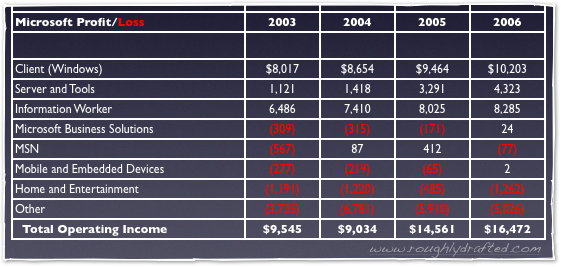
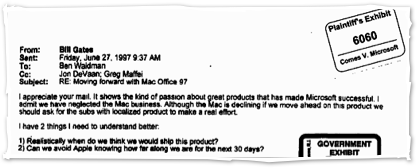
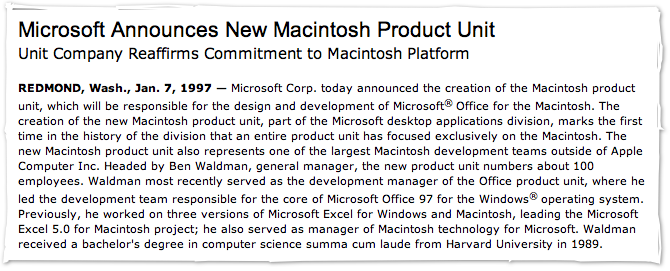


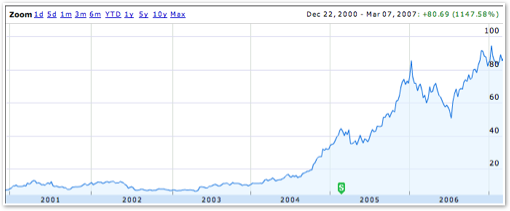
 Send Link
Send Link Reddit
Reddit Slashdot
Slashdot NewsTrust
NewsTrust





